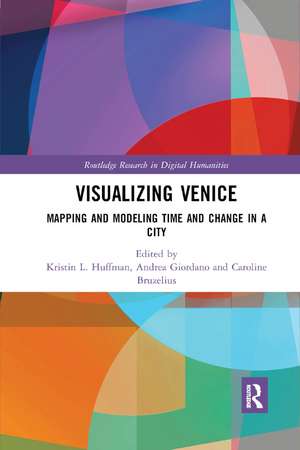Visualizing Venice: Mapping and Modeling Time and Change in a City: Routledge Research in Digital Humanities
Editat de Kristin L. Huffman, Andrea Giordano, Caroline Bruzeliusen Limba Engleză Paperback – 12 dec 2019
The volume is one of the first collections of essays to integrate the theory and practice of visualization technologies with art, architectural, and urban history. The chapters demonstrate how new methodologies generated by technology can change and inform the way historians think and work, and the potential that such methods have to revolutionize research, teaching, and public-facing communication.
With over 30 images to support and illustrate the project’s work, Visualizing Venice is ideal for academics, and postgraduates of digital history, digital humanities, and early modern Italy.
| Toate formatele și edițiile | Preț | Express |
|---|---|---|
| Paperback (1) | 389.38 lei 6-8 săpt. | |
| Taylor & Francis – 12 dec 2019 | 389.38 lei 6-8 săpt. | |
| Hardback (1) | 874.74 lei 6-8 săpt. | |
| Taylor & Francis – 3 oct 2017 | 874.74 lei 6-8 săpt. |
Din seria Routledge Research in Digital Humanities
-
 Preț: 310.71 lei
Preț: 310.71 lei -
 Preț: 273.92 lei
Preț: 273.92 lei -
 Preț: 389.38 lei
Preț: 389.38 lei -
 Preț: 374.21 lei
Preț: 374.21 lei -
 Preț: 381.77 lei
Preț: 381.77 lei - 9%
 Preț: 934.96 lei
Preț: 934.96 lei
Preț: 389.38 lei
Nou
Puncte Express: 584
Preț estimativ în valută:
74.52€ • 77.51$ • 61.52£
74.52€ • 77.51$ • 61.52£
Carte tipărită la comandă
Livrare economică 14-28 aprilie
Preluare comenzi: 021 569.72.76
Specificații
ISBN-13: 9780367885717
ISBN-10: 0367885719
Pagini: 174
Dimensiuni: 156 x 234 x 10 mm
Greutate: 0.45 kg
Ediția:1
Editura: Taylor & Francis
Colecția Routledge
Seria Routledge Research in Digital Humanities
Locul publicării:Oxford, United Kingdom
ISBN-10: 0367885719
Pagini: 174
Dimensiuni: 156 x 234 x 10 mm
Greutate: 0.45 kg
Ediția:1
Editura: Taylor & Francis
Colecția Routledge
Seria Routledge Research in Digital Humanities
Locul publicării:Oxford, United Kingdom
Public țintă
Postgraduate and UndergraduateCuprins
Overview: The Visualizing Venice Enterprise
Part 1: Introductory Essays
1 The Role of Digital Visualization for the History of the City
2 Visualizing Venice: Teaching, Training, and Imagining a New Kind of Urban and Architectural History
3 Visualizing Venice: Developing a Methodology for Historical Visualization
Part 2: Historical Case Studies
4 Buildings that Never Were: The Unbuilt Projects for the Civic Hospital of Venice
5 Architectural and Urban Change Over Time: The School, Church, and Monastery of Santa Maria della Carità
6 Mapping Change and Motion in the Lagoon: The Island of San Secondo
7 Visualizing the Treves Botanical Garden in Padua: From Documentary Research to Laser Survey and 3D Modeling
8 Research on Lost Buildings in Venice: The Cathedral of San Pietro di Castello
Part 3: Tools, Technologies, and Training
9 Visualizing Venice: An Historical Overview of the Role and Application of Architectural and Urban Modeling
10 The History of Cities and HGIS
11 Digital Technologies and Exhibition Culture: Reactivating Art Installations through Virtual Reconstructions
12 Interactive Exhibitions: New Interfaces for Engaging Visualizations
13 Guidebooks and Mobile Applications: A New Mode of Communication
14 Digital Art History: Building a "Model" for Student Engagement
15 Visualizing Venice Summer Workshops for Graduate Students and Beginning Scholars
Visualizing Venice to Visualizing Cities: Future Horizons
Conclusion
Appendix
Part 1: Introductory Essays
1 The Role of Digital Visualization for the History of the City
2 Visualizing Venice: Teaching, Training, and Imagining a New Kind of Urban and Architectural History
3 Visualizing Venice: Developing a Methodology for Historical Visualization
Part 2: Historical Case Studies
4 Buildings that Never Were: The Unbuilt Projects for the Civic Hospital of Venice
5 Architectural and Urban Change Over Time: The School, Church, and Monastery of Santa Maria della Carità
6 Mapping Change and Motion in the Lagoon: The Island of San Secondo
7 Visualizing the Treves Botanical Garden in Padua: From Documentary Research to Laser Survey and 3D Modeling
8 Research on Lost Buildings in Venice: The Cathedral of San Pietro di Castello
Part 3: Tools, Technologies, and Training
9 Visualizing Venice: An Historical Overview of the Role and Application of Architectural and Urban Modeling
10 The History of Cities and HGIS
11 Digital Technologies and Exhibition Culture: Reactivating Art Installations through Virtual Reconstructions
12 Interactive Exhibitions: New Interfaces for Engaging Visualizations
13 Guidebooks and Mobile Applications: A New Mode of Communication
14 Digital Art History: Building a "Model" for Student Engagement
15 Visualizing Venice Summer Workshops for Graduate Students and Beginning Scholars
Visualizing Venice to Visualizing Cities: Future Horizons
Conclusion
Appendix
Notă biografică
Kristin L. Huffman is an Instructor in the Department of Art, Art History, and Visual Studies at Duke University.
Andrea Giordano is Professor at the University of Padua and coordinator of the Visualizing Venice’s 3D modeling team.
Caroline Bruzelius is the A.M. Cogan Professor of Art and Art History and a founder the Wired! Lab at Duke University and of Visualizing Venice.
Descriere
Visualizing Venice engages with the variety of disciplines and analytical methods generated by technologies such as GIS mapping and historical cartography, databases, 3D images, video animations, prototyped models, and applications for mobile devices and the web. The essays demonstrate how the new methodologies generated by technology c
